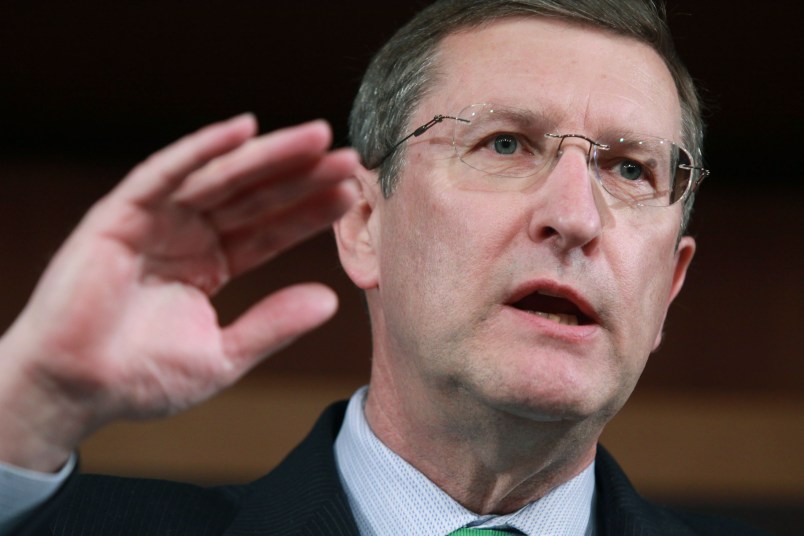Last night, Kent Conrad nearly gave Max Baucus a heart attack. Or so it seemed. During a hearing about the Senate Finance Committee’s health care bill, Conrad said he’d need to see a complete cost analysis of the legislation before he was willing to vote on it–a stipulation that, according to CBO chief Doug Elmendorf, promised to delay the Baucus bill by two weeks.
Conrad ultimately backed off from this demand, and today, with his support, the committee agreed not to hold a vote until a preliminary analysis could be completed–a compromise that will surely shorten the delay by several days. But this was only the latest in a series of power plays that have many Democrats and health care reformers wondering just what his gambit is.
“He’s provided us with two main hurdles,” said a Senate Democratic aide. “He said from the beginning that he wanted to focus on entitlement reform and deficit reduction…and then he opposed the public option.”
Conrad’s focus on deficit reduction should come as no surprise to anybody who’s watched the man at work. With perhaps one major exception (his vote for Medicare Part D), he is a genuine deficit hawk. This is particularly true with respect to domestic legislation, though he also voted against the Iraq war authorization. Throughout the public health care debate, and in negotiations with colleagues, he’s put a major premium on keeping the bill’s price tag low, and making sure that reforms “bend the cost curve” (bring the rate of health care inflation) downward. This at the expense of making sure that affordable coverage is available to everyone who will be required to buy insurance under the terms of the bill.
Yesterday was not the first time Conrad has leveraged Elmendorf’s by the book approach to put the brakes on health care reform. Earlier this summer, he got the CBO chief to admit that both the House’s health care legislation and the Senate HELP committee’s bill would do nothing to reduce costs. And more recently he asked Elmendorf to provide cost analysis for all health care legislation beyond the usual 10 year window, to make the point that the bill he worked on–the Finance Committee’s bill–is the big (and perhaps only) cost saver.
Cost savings are crucial. Almost no Democrat or reformer would dismiss its importance. But for Conrad it’s more important than doing what’s useful for the cause of reform, or for President Obama, or the Democratic Party. It’s led him into a situation where even key Democrats don’t know what he’ll do next.
One of the most surprising things he’s done, though, won’t make the bill cheaper, or bend the cost curve down. Early in the Finance Committee’s process, Baucus tasked Conrad with finding a compromise on the public option that could win the support of Republicans. Conrad came up with co-ops.
“He said he was being a loyal soldier and doing what was asked of him by the chairman,” says Richard Kirsch, national campaign director for Health Care for America Now. “But now that that effort’s failed, he’s kind of standing in the way.”
“He did his best,” Kirsch adds, “but having been unsuccessful, it would be best if he went back to what he aligned himself with in the beginning.”
To this day–long after the co-op compromise failed–Conrad refuses to take a position on the public option, calling it “moot” and insisting that a co-op plan–and only a co-op plan–will pass the Senate. In a rare departure from CBO orthodoxy, Conrad even said he disagreed with Elmendorf that co-ops will be ineffective competitors in the health insurance market.
“It’s gone from assignment to a mission that’s putting him out of step with the majority of Democrats,” Kirsch says.
Conrad’s office did not respond to a request for comment.
It’s unlikely that Conrad will ever end his crusade for a cheap, cost-saving bill. But he may have to address this curious position on the public option sooner than later. A 60th Democrat will likely en route to Washington from Massachusetts in a matter of weeks. And with three public option amendments to the Finance Bill in the pipe, his reluctant stance will soon become significantly less tenable.










